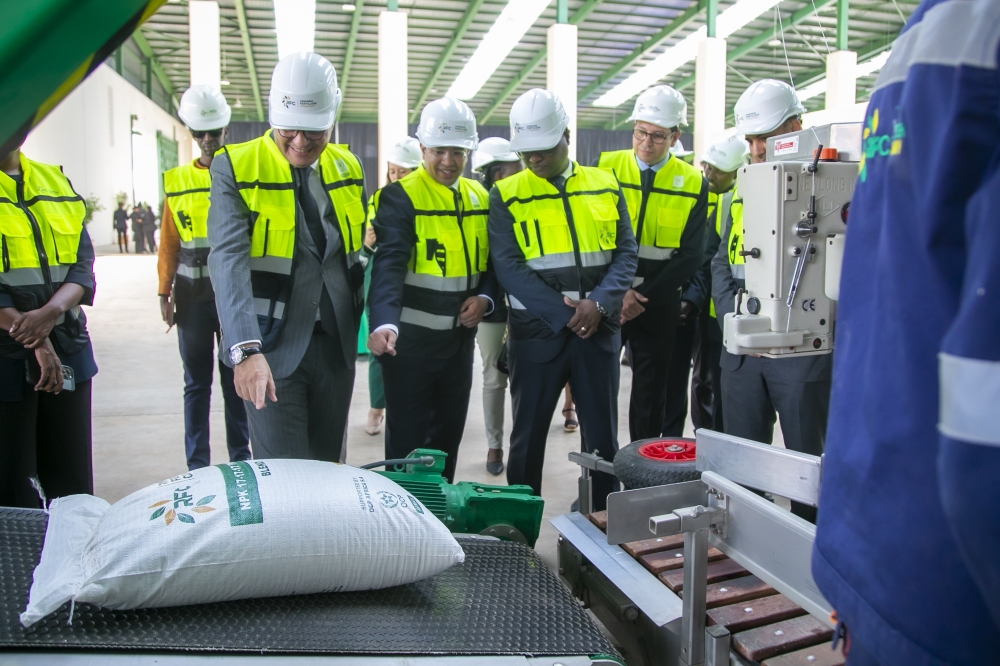

Foreign direct investment (FDI) inflows into Rwanda rose by 63.5 per cent to $289 million in the first six months of 2024, from $177 million recorded in the same period of 2023, according to a recent report by the National Bank of Rwanda (BNR).
Industry actors who spoke to The New Times described the performance as significant, and a testament to Rwanda’s efforts to provide a conducive environment for investors.
The Monetary Policy and Financial Stability Statement of September 2024, pointed out that the performance reflects improving business landscape fueled by robust domestic economic activity.
ALSO READ: Rwanda attracted $399 million FDIs in 2021
Kamran Ahmad, a British national, the founder and CEO of Kivu Choice, told The New Timesthat since the aquaculture firm started venturing into Rwanda’s fish industry in 2021, it has invested about $6 million so far, and plans to invest $10 million more in two years – up to 2026.
Kivu Choice is an integrated aquaculture company based in Rwanda with associated feed mill, hatchery, cage production, distribution, and sales outlets.
"We hit profitability before the end of year two. I don’t know any venture-backed businesses of that kind of scale that have been able to achieve profitability in such a short space of time, and growing as quickly as we’ve been growing,” he said.
Ahmad said this was proof that the industry has got a lot of potential, and that what they are doing is working. "We are going to continue to do our works and scale up this business for further impact and scale.”
The businessman said he was attracted to Rwanda because he was inspired by the vision of the leadership of the country and concrete steps taken towards achieving it.
"Rwanda has very clear government regulation as I’ve never experienced corruption in Rwanda, which is a very rare thing generally speaking,” he said, citing ease of doing business, and an untapped market potential in the aquaculture space, among other factors that can encourage investments.
When the British investor was navigating the system, from applying for permits to identifying appropriate location for business, and all the way to acquiring land, he received support from government institutions.
ALSO READ: Rwanda leads region in World Bank Business-Ready survey
Straton Habyarimana, an economist, said that the September 2024 Monetary Policy and Financial Stability Statement of September was released almost at the same time as the World Bank’s Business Ready (B-READY) 2024 report which shows that Rwanda made tangible achievements in facilitating investors.
The World Bank report assessed the regulatory framework and public services directed at firms, and the efficiency with which regulatory framework and public services are combined in practice. This first edition of Business Ready covers 50 economies.
Among the 50 economies assessed this year, the report idicated there are developing economies that rank among the top 10 in several categories, citing Rwanda Rwanda for public services and operational efficiency.
Habyarimana said that the reason the government does that is to encourage increase in investments, which helps the country and its people in various ways.
He said the projects in which investors inject their money or the companies they establish contributes to the achievement of job creation target, referring to the government of Rwanda’s goal to create at least 250,000 jobs per year under the second National Strategy for Transformation (NST2).
Such job creation target, he said, is not a simple undertaking, "it requires that the availability of those who come to support Rwandans in making investments.”
Habyalimana also indicated that the investors who create companies and projects often pay taxes which support the national treasury, pointing out that they contribute to setting up infrastructure including roads, schools, health facilities, and running recurrent government activities.
The economist highlighted two key benefits of attracting foreign investors to Rwanda:Technology transfer where he said foreign investors allow Rwanda to acquire advanced technologies.
Enhancing Rwanda's reputation as a secure and investor-friendly destination, which can attract more investment in the future."
Habyalimana noted that foreign investors can benefit Rwandan consumers by providing essential goods and services. Additionally, their operations can boost Rwanda's exports, helping to improve the country's balance of payments and reduce its trade deficit.
"As trade deficit decreases, we have a stable currency, and foreign currency to use, all of which has a positive impact on the economy,” he said.
Spread of FDI inflows
According to the central bank report, the financial sector remains the largest recipient of FDI, driven by foreign banks acquiring domestic banks and the sector’s high profitability.
For instance, in June, 2024, Equity Group – a Kenyan financial services holding firm – acquired 91.93 per cent stake in Rwanda’s Cogebanque, with a payment of an aggregate cash consideration of Rwf54.68 billion ($48.1 million at the time) for the equity stake.
ALSO READ: Equity Group acquires Rwanda’s Cogebanque
Besides, FDI inflows into the ICT and energy sectors have grown due to government initiatives aimed at enhancing the country’s connectivity and ensuring universal access to electricity, respectively, the NBR publication showed.
Finally, it pointed out, the manufacturing and tourism sectors record steady FDI inflows as the country seeks to boost its domestic industry and enhance Rwanda’s competitiveness in hosting international events to improve the country’s trade imbalances.


